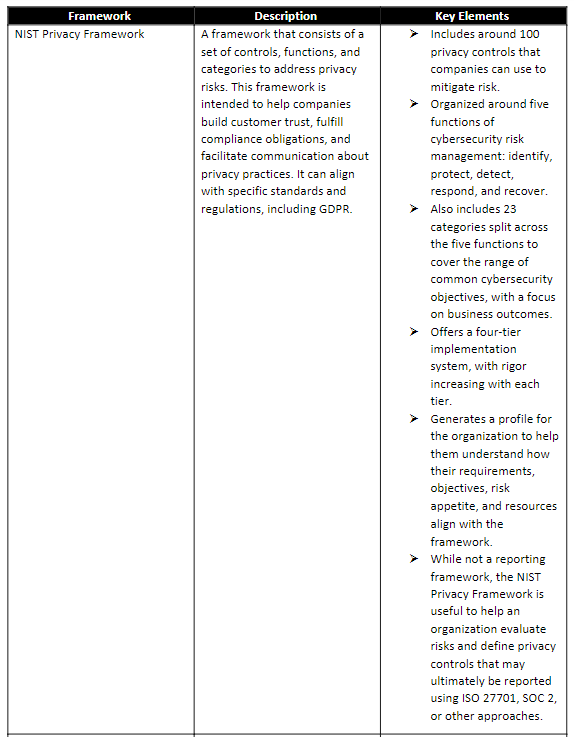Data Privacy Frameworks in the Era of Industry 4.0

It’s the era of Industry 4.0, and manufacturers are more technologically advanced than ever.
According to BDO’s 2024 Manufacturing CFO Outlook Survey, manufacturers are doubling down on their digital investments: 47% plan to increase investments in artificial intelligence (AI) and machine learning this year. Other technologies are seeing similar investments, including cloud computing (46%) and the Internet of Things (42%).
But whenever technology evolves, the risk landscape expands. Thirty-nine percent of manufacturers see data privacy breaches as a greater threat to their business in 2024 than in 2023, and 45% will hire for cybersecurity skills this year. Among many risks like impacting employees and third parties, a data breach or ransomware attack could cause loss of trade secrets and disruption of operations, which are costly consequences for manufacturers.
Greater connectivity and data sharing are also changing manufacturers’ compliance obligations, especially as they incorporate more personal data collection and processing features into their manufactured products and associated services, including the use of AI which has its own set of personal data considerations. For example, manufacturers with a global presence may possess EU-citizen data, placing them within the scope of the EU’s General Data Protection Regulation (GDPR). Even manufacturers without global operations may be subject to international regulations if they work with international suppliers, which means no company can afford to disregard these considerations. Regulatory requirements continue to expand regionally and globally with the ongoing development and passage of new laws and regulations focused on privacy and the ethical use of AI.
To protect themselves, their data, and their customers, manufacturers need to maintain strong data protection controls through a comprehensive data privacy program. Implementing data protection and privacy frameworks are crucial to the success of the program.
The Business Case for Data Protection Frameworks
To comply with U.S. and international regulations, manufacturers need a data protection framework to meet complex legal and regulatory requirements, build strong partnerships, and mitigate risks of non-compliance, such as fines and fees and loss of customer and employee trust.
By adopting a comprehensive framework, the organization can achieve various advantages beyond compliance, such as:
-
- Enhancing business resilience through mature data privacy and data protection program controls (i.e., moving beyond a ‘contractual or policy perspective’ regarding privacy).
-
- Strengthening stakeholder confidence in the organization’s privacy policies and cultivating trust with customers and employees.
-
- Minimizing the burden of proof when questioned about policies for vendor management and due diligence purposes.
-
- Demonstrating the effectiveness of the company’s data privacy program to customers, prospects, and regulators.
-
- Improving efficiency and rigor for external reporting purposes.
-
- Securing a successful audit or complying with the EU-US Data Protection Framework certification obligations.
Selecting the Foundational Framework
There are many privacy control and reporting frameworks available to manufacturers. Three of the most common frameworks are the NIST Privacy Framework, ISO 27701, and SOC 2:



Additional Considerations for Choosing and Tailoring Your Framework
Rather than sticking to one framework, organizations often collaborate with external parties to create a hybrid framework that integrates multiple industry standards. This enables them to build a program that meets both U.S. and international compliance requirements. Therefore, they do not need to choose a single framework that covers all controls.
When determining how to select and tailor your framework, consider the following questions:
- Where do you operate? What are the dominant data privacy laws and regulations in those regions? Which privacy laws apply to your company and the services you provide?
- Which industry standards are most common for your manufacturing sector (e.g., auto vs. clothing)?
- Where are your customers and employees based, and what are the dominant data privacy laws in those geographies? Is there a Works Council in that geography?
- Where are your suppliers located? Note that you will need full visibility into your supply chain to address this question.
- What types of personal data does the organization collect and are there cross-border storage considerations?
- What privacy and data-related risks does your company face? How are you addressing these risks? Do you use a tool to monitor and manage compliance obligations?
- Where are you trying to expand your customer base and how will that impact your privacy obligations?
- What privacy regulations do your customers have to adhere to? How does that impact the regulatory obligations and risks your company faces?
What’s Next?
Adopting these standards can be challenging, and manufacturers may find that working with a third-party advisor can help.
We start with a readiness assessment to help clients understand their current level of privacy program maturity and identify any gaps they need to address, especially ahead of an audit. We work with organizations to develop a clear picture of their contractual and regulatory commitments, the types of personal information collected, and where it is processed and stored. We work with our clients to explain why these details matter to overall organizational compliance and resiliency.
Our global privacy and data protection and third-party attestation teams focus on providing independent assessments, as well as Data Protection Officer services, privacy managed services, privacy technology implementation, and comprehensive services around SOC reporting and ISO certifications, all while helping clients protect and grow their businesses.
Ready to enhance your data privacy reporting? Contact us today to learn which reporting approach is right for you.
Written by Val Laufenberg, Maurice Liddell and Bill Pellino. Copyright © 2024 BDO USA, P.C. All rights reserved. www.bdo.com
 Services
Services

